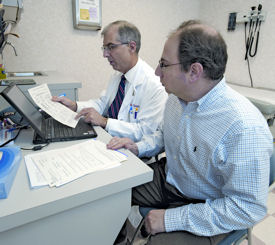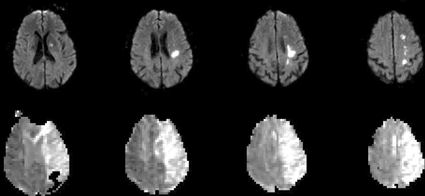Do placebos have a place in clinical practice?
Placebo use is common in internal medicine. But is it ethical? Experts examine the disconnect between the standards of medicine, and how it's actually practiced in the office.
Several professional societies discourage them. Many medical ethicists frown on them. But internists use them all the time in everyday treatment, recent research suggests.
Placebos, and the placebo effect, have been discussed in the medical research community for decades, thanks to a number of studies that suggest they may have real and measurable effects on certain conditions. Yet it was a different sort of study, one that found placebo use among physicians is fairly common, that recently brought the issue from the lab to the physician's office.

The Oct. 23, 2008 BMJ study found that, of 679 general internists and rheumatologists surveyed, about half reported using placebo treatments regularly, with 62% saying it was ethically permissible to do so. Over-the-counter analgesics and vitamins were the most commonly used placebos, though 13% of doctors reported using sedatives and antibiotics as placebos. Only 2%-3% said they used sugar pills or saline.
The vast majority of these internists did not describe the medicine to their patients as placebos. This flies in the face of the American Medical Association's ethics policy, which prohibits placebo use without a patient's knowledge on the basis that it undermines trust and could harm the patient. (See sidebar: “Are placebos ethical?”)
“It's clear from the research that there is a disconnect between the current official standards of what is legitimate and not legitimate in terms of placebo, and what those in the trenches do,” said Ted Kaptchuk, an associate professor at Harvard Medical School with a doctorate in oriental medicine, and a co-author of the survey. “We need to really examine the question of whether and how to use placebos across the medical and patient community.”
Defining placebos
When talking about placebos, one must first define terms. In the research community, the word “placebo” refers not only to sugar pills and saline—inert agents with no known biochemical effects—but also active agents, like vitamins or antibiotics, which are prescribed primarily to promote positive expectations. The definition, then, has more to do with the physician's intention or belief about a treatment than the mechanism of the treatment itself.
The BMJ researchers were aware that their physician subjects might balk at the use of the word “placebo,” so they structured their survey to first involve broad questions about prescribing behavior, and finished with items whose responses included an obvious definition of placebo treatment.
“People bring so much baggage to the term ‘placebo,’ which is why we structured our survey the way we did,” said Jon Tilburt, ACP Member, the study's lead author and assistant professor of medicine and biomedical ethics at Mayo College of Medicine. “There is an undercurrent of people in medicine who only view inert substances as placebos. They will call vitamins or acupuncture ‘seat-of-the-pants medicine’ or ‘empirical improvisation’ but they will adamantly deny that they give placebo.”
Indeed, of the 28 readers who responded to an informal, unscientific poll on the ACP Internist Web site, 82% said they never use placebos, compared with 45% in the BMJ survey. The difference in responses may lie, in part, with the fact that the poll began by asking readers whether they used placebos, rather than questioning them more indirectly about their prescribing habits, Dr. Tilburt said.
“Placebos create huge moral dilemmas for physicians,” said Dan Ariely, PhD, a professor of behavioral economics at the Massachusetts Institute of Technology and author of Predictably Irrational. “Doctors don't want to see themselves as practicing voodoo medicine.”
How placebos are used
Yet research suggests that placebos really can work as well as traditional medicine for certain conditions. In particular, they sometimes seem to work for many chronic conditions, like chronic pain, chronic fatigue, arthritis, headache, insomnia, chronic digestive disorders, asthma, depression and anxiety, Dr. Kaptchuk noted in a June 2002 Annals of Internal Medicine article.
Put another way, placebos work for illnesses that have a strong psychosocial component, Dr. Kaptchuk said.
“All illnesses have this component to some extent, but (placebo) is more likely to change outcomes in an illness that is primarily about the patient's experience,” Dr. Kaptchuk said. “If you look at the randomized controlled trials, the places where you see the placebo effect work are in illnesses with self-reported outcomes, like fibromyalgia or chronic pain.”
These conditions are also the ones that are most frustrating to a patient, said Sharon Deskins, ACP Member, a primary care physician in St. Joseph, Mich.
“These patients just hurt most of the time, and they would like to hurt a little bit less. Older patients, in particular, just want a little improvement,” Dr. Deskins said.
Placebo use in practice
Research aside, it's common for physicians to feel pressured by insistent patients into prescribing placebos. (If a patient relents, the placebo is being used by the physician in its most basic sense: the Latin word literally means “I shall please.”) In particular, physicians report getting pressured at least weekly by patients with colds who want antibiotics.
“(Upper respiratory infections are) probably the one area that I prescribe meds even though I don't truly believe they are beneficial,” said Faith Protsman, MD, a solo general internist in Gilroy, Calif. “If the patient accepts my explanation of a viral illness and is willing to do over-the-counter and supportive measures, I leave it at that. If a patient really demands a medication, I will often use a course of amoxicillin. I can justify it since secondary bacterial infections can occur after viral infections.”
R. Scott Hanson, ACP Member, a general internist in Mariana, Fla., encourages his cold-ridden patients to use nasal saline and wait a few days, but he also gives them a contingency prescription for an antibiotic in case the symptoms worsen or don't go away. To discourage the patients from filling their prescriptions immediately, he talks to them about the downsides of antibiotics—from side effects like diarrhea and yeast infections, to bacterial resistance in the community.
“The vast majority of patients follow my instructions; they don't just run out and fill the prescription,” Dr. Hanson said. “I think having the script in their hands can have a placebo effect, in that they know if things really get worse, they are covered.”
Ideally, prescribing antibiotics when they aren't clearly indicated should not be done, because of the risk of spreading resistance, said Franklin Miller, PhD, member of the senior faculty in the department of bioethics at the National Institutes of Health. Given the very real and constant pressure internists face from their patients, however, Dr. Hanson's solution seems a good compromise, Dr. Miller said.
“If only a small percentage of his patients do actually fill the prescription, it is a better solution than just handing out prescriptions to be done with it,” Dr. Miller said.
More than pills
According to a 2007 review article in Pain Practice, placebo “represents the psychosocial aspect of every treatment … the psychosocial context that surrounds the patient.” By this definition, placebo isn't just about the treatment itself, but all of the layers of context that surround the treatment, from the doctor's demeanor to the color of pill bottles.
Even the cost of pills can influence their efficacy. A March 5, 2008 study in the Journal of the American Medical Association found that patients experienced a more dramatic reduction in pain from electric shocks if they took placebo painkillers that were described as full price, compared with a group that took placebo painkillers described as discount price.
Physicians need to harness the power of this placebo effect, and exercise care when prescribing generics to patients, said Dr. Ariely, study co-author.
“When physicians prescribe generics, they need to show excitement from it. They shouldn't sell it as, ‘I'm giving you the cheapest thing; it's five dollars less.’ It should be more like, ‘I'm giving you a well-tested, proven medication,’ Dr. Ariely said. “Nobody wants to take something that is labeled as ‘generic’; it suggests inferiority.”
The doctor-patient relationship is another important aspect of context, as a supportive relationship can enhance a patient's response to treatment, according to a May 2008 article in the BMJ. The study assigned 262 patients with irritable bowel syndrome to either clinical assessment or observation only; a group which got sham acupuncture; or a group which got sham acupuncture plus a warm, attentive doctor-patient relationship. While patients in all groups reported pain relief, the “relationship group” did the best, with 37% reporting moderate or substantial improvement, compared with 20% in the sham acupuncture-only group, and 3% in the observation group.
The results not only support the idea that placebo, in the sense of “false treatment,” can work, but that it can be enhanced by other means, in this case, the physician's attitude or behavior. Indeed, such behavior may be considered a form of placebo in and of itself, and could exercise an effect on active treatments as well as inactive ones, the study's editorial noted.
In his practice, Dr. Hanson tries to foster a positive relationship by explaining patients' conditions to them in detail; he believes this helps them feel better, he said.
“A lot of it is just taking the time to help the patient get a better sense of why their body is doing what it's doing,” Dr. Hanson said. “It's a placebo effect in the sense that you are kind of redirecting them in their thoughts about their health.”
Fibromyalgia patients, in particular, seem to benefit from a positive physician interaction and a lot of encouragement, Dr. Deskins said.
“It's a frustrating condition because we don't have a cure, and not all treatments work for people,” Dr. Deskins said. “Approaching the patient with a positive attitude, saying that perhaps we can't cure this but we can certainly make you feel better, is key. A good therapeutic relationship helps people in and of itself.”
Some internists may feel they don't have time during patient visits to cultivate the kind of interaction that might produce a positive placebo effect. But Dr. Protsman said she thinks the extra time is worth it.
“If patients feel the doctor listens and is concerned about their condition, they will more likely trust the treatment plan and follow it,” Dr. Protsman said. “So I take the time to listen to the patient, which means I see fewer patients per day, but I have a stronger relationship with each patient. And sometimes, just my listening to them can help them feel better.”
Besides, it's possible to be supportive without devoting a great deal more time than usual, Dr. Kaptchuk said. In his IBS study, for example, the physicians in the successful “relationship” group really only spent 25 minutes more—total—with patients than those in the sham acupuncture-only group.
“It has more has to do with being able to connect with the patient,” Dr. Kaptchuk said. “I think this connection can be fostered artfully and poetically, and doesn't need to consume much time.”
Gray areas
If a physician prescribes an analgesic for chronic pain, knowing that the pill won't cure the pain but that it may take the edge off, is that considered a placebo? If a physician has seen a treatment, like acupuncture or supplements, work for other patients although he doesn't know why, is he using a placebo effect if he prescribes it?
It's unclear, said Dr. Miller. As was mentioned, the standard definition is essentially in the physician's intent—whether he is prescribing something because he believes it may work, or because he believes it will alter the patient's expectations. And there is often overlap between these two extremes.
“Let's say you have a patient with arthritis, and the physician recommends Tylenol. The data are fairly equivocal about whether Tylenol is better than placebo for arthritis, but the physician thinks there is some chance it will help treat the condition, and that there is also a chance it will help the patient on psychological grounds,” Dr. Miller said. “This is a murky area of mixed motivations, and I think a lot of practice falls into this area.”
Consider, then, how practitioners handle such gray areas in their offices:
- Dr. Hanson said he sometimes prescribes glucosamine/chondroitin for patients with joint pain, though he knows there is mixed scientific evidence about its benefit. He does so because he thinks the supplements may possibly work, and he doesn't see the harm in trying them out. “I don't, though, consider it appropriate to give someone something that you know is completely inert. I kind of feel like the prescriber has to have some belief that it works.”
- Keith Michl, FACP, a solo general internist in Manchester Center, Vt., said he feels the same way about prescribing over-the-counter cough medicine to patients with colds. “I'm a little skeptical sometimes about the value of cough suppressants for upper respiratory infections, but I use them myself, and they seem to work a little bit sometimes.”
- Jacqueline Fincher, FACP, a general internist in Thomson, Ga., said she sometimes prescribes an over-the-counter expectorant to her cold patients, because it will relieve some symptoms as well as assure patients that she is taking their health seriously. “If a patient comes in with a cold and you tell them not to worry, just wait three days and you'll be fine—then they don't feel like they get their $30 worth of copay. I prescribe Mucinex because it thins the mucus, makes them feel a little better, and reassures them, which is all they want and need a lot of the time.”
- Farr Curlin, MD, assistant professor of medicine at the University of Chicago, said he may tell a patient with chronic abdominal pain to try vitamins, or a gas-related medicine, or a particular diet. “I don't think any of these are the key, in and of themselves, but patients may find it helpful. I am not going to work too hard to find out if they are helpful because of a placebo effect or a physiological effect.”
Often, said Dr. Tilburt, prescribing a harmless medication like vitamins becomes a sort of shorthand for the caring, supportive relationship that most physicians know is helpful to their patients.
“Our health care system isn't really set up to reimburse for empathy; it reimburses for widgets,” Dr. Tilburt said. “So doling out something becomes sort of a modest gesture toward a mutual hope that the patient will get better.”





